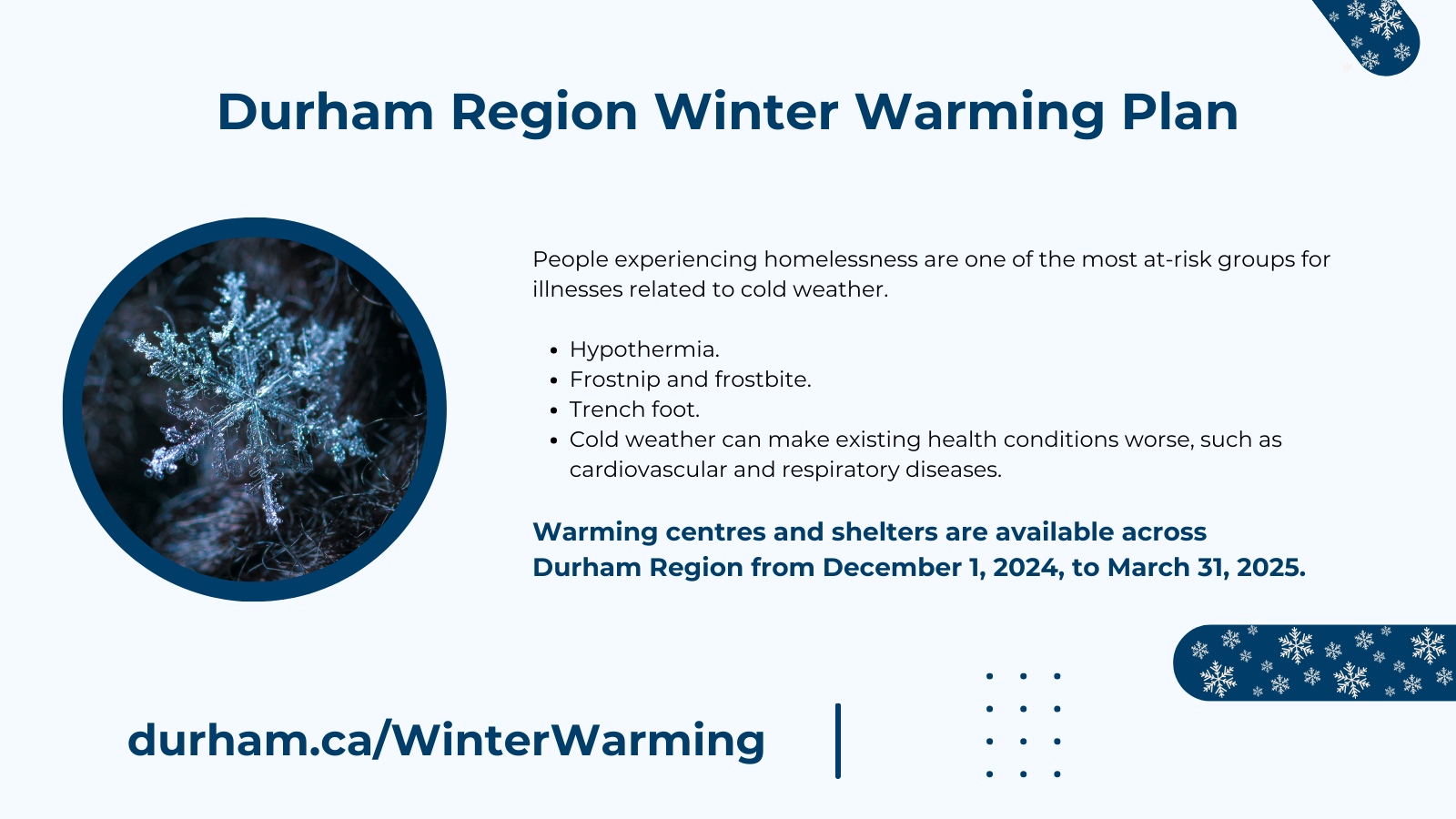Unsheltered and homelessness
Durham Region’s Winter Warming Plan is in place to support those living without shelter. Warming centres are open from December 1, 2024, to March 31, 2025, to offer warmth from the cold. During Cold Weather Alerts issued by the Durham Region Health Department, the Region’s emergency shelters will increase the number of mats/cots and safe spaces and, if necessary, may use hotel accommodations; shelters remain open during the day. For homelessness support, please contact the Region at [email protected] or call 311 extension 5510.
Do you need support?
If you need support or shelter, contact the Region of Durham at 905-666-6239 extension 5510. The Outreach Team is available 24 hours a day, seven days a week.
Region of Durham
The Region of Durham is legislated by the Province of Ontario as a Service System Manager (SSM) for Housing and Homelessness through the Housing Services Act and is the designated Community Entity by the federal government for the homelessness system. A local SSM role is unique to Ontario.
The Region is responsible for:
- social services
- homelessness
- shelters
- community housing
- public health
- police services
As part of its commitment to end chronic homelessness, the Region provides several programs and outreach services.
| Who to call |
To report an immediate safety concern, call 9-1-1
If it is not urgent, contact:
To provide feedback to the Region: Provide feedback online regarding general concerns. |
| Opioids and overdose prevention |
|
Visit the Region of Durham's Opioids and overdose prevention webpage to learn about opioids and how to prevent an overdose. Found a needle? To report a discarded needle or sharp found in a City park, please contact Service Oshawa at 905-436-3311. Needles found on private property are the responsibility of the property owner or landlord. Learn about safe needle handling and disposal guidelines on the Region of Durham's website. |
| Food banks and meal programs |
| Find information about food support programs, including community meals and food banks, on 211 Durham or call or text 2-1-1. |
| Housing support (housing outreach or eviction prevention) |
|
The Region of Durham provides Housing Programs, including Eviction Prevention and Housing Outreach Workers. Learn more on the Durham Region's Housing Supports webpage or contact the Region: Email: [email protected] |
| Low income supports |
| Visit the Region of Durham’s website for additional information on low income supports available across the Region. |
| Shelters |
|
For help with homelessness support: Email: [email protected] Emergency shelter locations include the newest shelter, 1635 Dundas, which operates 24/7, provides wrap-around supports and is pet-friendly. View the Region of Durham's Housing-Focused Shelter Locations or visit the Emergency Shelters for Victims of Violence webpages for more information on 1635 Dundas and other emergency shelter locations in Oshawa. If you see or know someone in need of immediate emergency shelter, Additional resources are available on the Durham Region Social Services Department webpage for vulnerable individuals, including those concerned about income, shelter, food security, mental health or transportation. |
| Warming or cooling centres |
|
Warming centres The Region of Durham has a Winter Warming Plan. From December 1, 2024, to March 31, 2025, there are shelters and warming locations open across Durham Region. Transportation support is available through the Durham Region Outreach Team for residents who need help accessing a shelter or warming location. For more information, visit durham.ca/WinterWarming
Cooling centres Cooling centres provide a safe place for people to cool down when it is hot outside. View the Region of Durham's list of Cooling Centres. |
| 211 Durham |
|
211 is free, confidential, and available 24/7 (including holidays) in 150+ languages, providing information and referrals to Ontario's community, social, health-related, and government services. The line is answered by certified Service Navigators who will help you with your search. 211 can be accessed by:
|
City of Oshawa
The City of Oshawa is a compassionate and committed partner. As a partner, we are supporting the Region in its programs and working collaboratively to help address the complex challenges related to unsheltered individuals in our community. The City has allocated funding, resources and staffing.
| Advocacy |
The City continues to actively request assistance from all levels of government to help resolve the homelessness and mental health issues in our community, including:
Additionally, we continue to collaborate with the Region and various partners and agencies, including DRPS, Lakeridge Health and social service organizations. |
| Business and neighbourhood support |
|
The City continues to support the Region as a committed partner and has responded to the acute health and safety challenges in the downtown core and surrounding public spaces by allocating funding, resources and staffing. Examples of the City’s actions to support residents and businesses include:
|
| Creative solutions |
As a collaborative partner, the City has been key in helping to establish or advance several innovative programs offered by the Region, including:
To learn more about these Regional programs, visit the Region’s Street Outreach webpage. |


